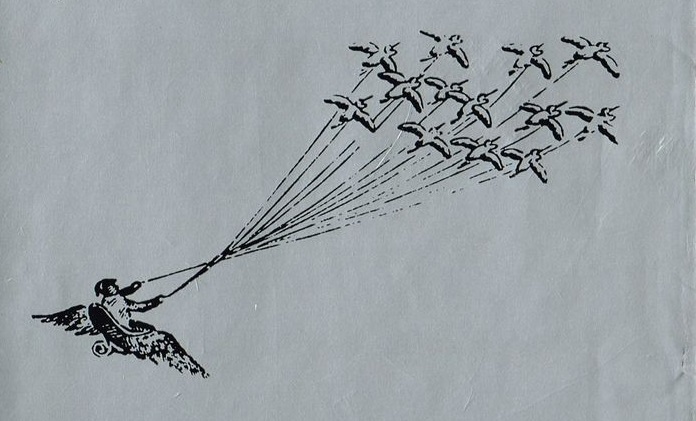
Mr. Baldock, a mild little man who grew violets, was Elspeth’s godfather and now he looked at her as if he had been given a little seedling to cherish and it had suddenly grown into a rampant vine. ‘Can’t you get this nonsense out of her head?’ Elspeth had heard him ask Aunt Bevis. ‘Is nonsense the right word?’ asked Aunt Bevis. ‘Well, no,’ said Mr. Baldock. ‘But Elspeth! Our pretty little girl!’ ‘She’s not a little girl,’ said Aunt Bevis. ‘It seems so unnatural,’ said Mr. Baldock. ‘Elspeth dear, are you sure?’
The family were more definite. ‘She’s out of her mind!’ said Uncle Arthur. ‘Girls get like this,’ said Aunt Euphrosyne. ‘It’s usually anaemia.’ ‘Elspeth is not the least anaemic,’ said Mother. ‘She has a lovely colour,’ and she began to cry. ‘She’s serious, Euphy.’ ‘I can’t believe it,’ said Aunt Euphrosyne, ‘Elspeth! Not Elspeth! Why, she was always the naughty disobedient one.’
In the introduction to this story, Fireworks For Elspeth, in her 1968 collection Swans & Turtles, Rumer Godden recalls that in writing the novel Black Narcissus (famously adapted by Powell and Pressburger) she initially set out to write something of an anti-nun polemic, which may come as a surprise to the reader as the following short story, is, if anything, unsettling in its display of empathy.
The plot concerns a woman who is about to join a convent and the anguish involved both for her and for her disapproving friends and family, brought to a head at a lunch party arranged by Elspeth’s mum to mark her last day at home. The guests are aggressively well-intentioned in voicing their dismay, pitched somewhere between Joan of Arc’s sceptics and townspeople outraged about young women being lured from their bedrooms to Count Dracula’s castle.
Elspeth’s decision to become a nun is a threat to the sense of normality of her family and friends. There’s a generosity in depicting both of these perspectives – being able to isolate and understand them, whether they stand up to scrutiny or not – and giving them both agency. It’s about a nun, but as a story touching on social awkwardness, desire, and identity, it could be about any number of things.
I found out about Rumer Godden through L’Elégance, another short story in the collection, or rather its 1982 TV adaptation (with no accent on the ‘e’). It’s on YouTube here and stars a severely-fringed Geraldine McEwan as the aspirational Miss Mountford (changed from ‘Mountfort’ in the original), a devoted reader of the upmarket magazine of the title, who saves up for a brief visit to a fancy French hotel once a year, for some respite from her job at a department store.
Miss Mountford arrives with her pretensions to a social class above her own, with her pinky held high to sip tea and her nose deep in columns of lifestyle advice, and hoping to find everything as it was before, only to be disillusioned by the attentions she receives from the new chef, who drinks too much, and isn’t as good-looking as the man we glimpse her absentmindedly daydreaming about. The relationship between fantasy and reality is subtly played with, to great effect, in what is still a naturalistic story.
There was also an adaptation of Fireworks For Elspeth around the same time, but it’s not online, unfortunately, so I haven’t seen it. Anyway, the interiority of the protagonist and how they are seen by others is what strikes the reader about both stories, and an escape – albeit one which might seems odd or idiosyncratic to others – from a life that they are unsatisfied with. Depending on the situation, you might identify more with the gallery of pointed remarks and raised eyebrows or feel yourself on the receiving end.